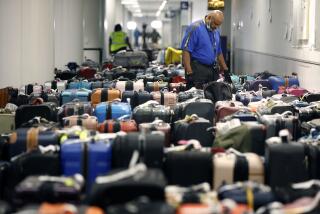Many Skeptical of Icahn’s Plan to Revive TWA : No Pay-Outs for 4 Years Under Chairman’s Pact
- Share via
NEW YORK — When financier Carl C. Icahn became majority stockholder in Trans World Airlines last fall, he borrowed a pilot’s jacket and ran around the company’s Manhattan offices jubilantly shouting, “We got ourselves an airline.” On Friday, Icahn took formal control of the company, becoming chairman and gaining a majority of the seats on TWA’s board. But the agreement under which he did so leaves Wall Street analysts wondering whether he can pilot the airline out of its financial troubles.
Icahn himself cited TWA’s rapidly growing losses as the reason for canceling his original agreement to buy the more than 48% of the airline that he does not already own. The estimate of operating losses for 1985 doubled to $140 million even as his investment bankers, Drexel Burnham Lambert, tried in vain to raise the cash needed to buy out minority shareholders, he said. He had offered $19.50 per share in cash and $4.50 in securities.
So Icahn scrapped his agreement to buy all of TWA. Instead, he and TWA agreed that he would become chairman and Drexel Burnham would raise $750 million in financing for the airline.
Unappetizing Alternatives
While analysts agree with Drexel Burnham’s statement that it is “highly confident” it can raise the money, they say that the new agreement leaves minority shareholders with no cash and unappetizing alternatives.
Instead of the $24-per-share combination of cash and securities they were to have received under the canceled pact, minority shareholders were given a choice: They can hold onto their common shares, which have not yielded a dividend since TWA was spun off as an independent company in early 1984, or they can exchange their shares for a new issue of preferred stock with a face value of $24 and paying $7.25 in annual dividends.
However, TWA said it expects dividends for the first four years to be paid in additional preferred stock rather than cash.
TWA also said that, after two years, it may choose to exchange the preferred stock for an issue of subordinated debentures, or “junk bonds,” paying 14.5% interest. If the bonds are issued within the first four years, TWA said, interest on them would also be paid by issuing additional bonds.
Analysts noted that the new pact saves the company from having to lay out any cash to its investors for four years. But the company’s debt would continue to grow as it defers payment, they said.
“This is a means of saving cash,” independent airline analyst Charles Hanneman said. “It is not good for the shareholder. When you put money into a company, you want a cash return.”
The stock market’s reaction to the pact, announced after the close of trading Friday, was negative. TWA’s stock, which as recently as late November had been trading at $22, closed at $14, down $1.125 from Friday’s close.
Louis Marckesano, an airline analyst for the Philadelphia brokerage Janney Montgomery Scott, had a more upbeat view of the new pact: “What this deal seems to do is to infuse the company with cash to create some staying power. It allows them to do any restructuring they have to do. They’re buying time to create a new image.”
Marckesano said the new pact gives TWA a better chance to survive than a total buy-out by Icahn. It keeps the public involved in the company and prevents Icahn from stripping it for its assets, he said. He predicted that TWA would come close to breaking even in 1986 and earn between $2 and $3 per share in 1987. The analyst said Drexel Burnham would have little trouble raising the $750 million in financing. Of that sum, $400 million is to be raised in trust certificates that offer as collateral TWA’s airplane fleet.
“That’s like a mortgage on a house,” he said. “If there is a default, the banks own the house, and they will own the airplanes as well.”
The remaining $350 million in financing will not be difficult to raise, Marckesano added, because “none of the money will be leaving the company to buy additional shares for Icahn. It will give TWA time to put its house in order.”
Marckesano said labor concessions agreed to by TWA’s pilots and machinists unions, as well as concessions offered by the flight attendants union that amount to a 15% cut in costs, will result in annual savings of between $240 million and $300 million.
Still, some analysts question whether the savings from the labor concessions and the new financing will be enough.
They say TWA faces a strike by its flight attendants, from whom it is demanding deeper cuts than those offered; its seasonal rises and falls in traffic are sharper than at most other airlines; its fleet of 163 planes is old; recent fare wars have drastically cut its revenues, and TWA, stronger internationally than domestically, is likely to suffer in 1986 from an expected drop-off in international travel and a deterioration in the value of the dollar.
Other analysts say that TWA’s morale has been severely damaged by the long fight for control of the airline, which Icahn began last spring.
“There are TWA resumes on the desks of every airline in the country,” said one analyst who declined to be identified.
More to Read
Inside the business of entertainment
The Wide Shot brings you news, analysis and insights on everything from streaming wars to production — and what it all means for the future.
You may occasionally receive promotional content from the Los Angeles Times.










